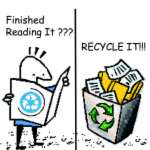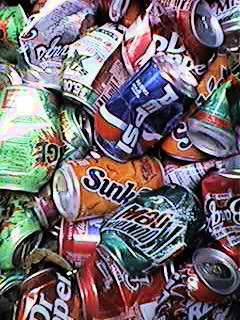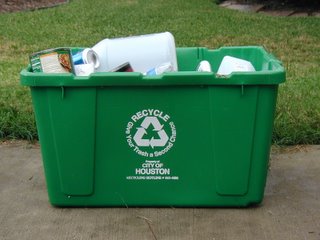
How to get recycling on your street
1. Why get recycling?
2. How to get doorstep recycling from your council
3. How to organise a community recycling scheme
4. How to recycle and reduce waste yourself
5. Feedback and comments
1. Why get recycling?
Over 50% of household waste can be recycled or composted, but we recycle only 12%. Recycling saves natural resources and reduces landfill sites, but councils have only recently begun to provide full facilities. With a little effort, recycling can be made easy and most people already have a recycling bank nearby.
Many local councils organise ‘kerbside recycling’. They provide plastic boxes, special bags or extra bins for each household to collect a mix of materials: glass, cardboard, plastic, cans and garden waste.
If you’re not serviced by one of these schemes already, this guide shows you how to:
* Get doorstep recycling from your council
* Organise a community recycling scheme
* Recycle waste yourself
2. How to get doorstep recycling from your council
Your council’s ‘environmental services’, ‘waste services’ or ‘recycling services’ department runs kerbside recycling. Find contact details for your council on your Local information page. You can ask for kerbside recycling because you have the law on your side.
If you’ve been told you can’t get kerbside recycling find out why not. Councils will often say that it is too expensive or difficult to provide kerbside collections for:
* High-rise flats
* Remote rural areas
* Properties on narrow streets
Even if you don’t get recycling now, don’t be hesitant to lobby for it.

You can:
* Write your council a letter proving local demand for recycling and send a copy to your councillor
* Get the support and names of other people in your area or building
* Ask for a less frequent collection service, which is cheaper for the council to run
* Request recycling banks within a few hundred metres
* Get recycling boxes collected from nearby if street access is poor
The councillor for your ward is there to represent you and help you access services. If you have difficulty getting recycling services you can lobby your ward councillor to arrange it on your behalf.
See guides on How councils & councillors can help you and How to lobby political representatives.
3. How to organise a community recycling scheme
If your community is poorly served by council recycling, why not organise your own scheme? With a little help from your neighbours, you can collect recycling yourselves and sell it on to recycling businesses. You can even raise cash credits from your council for every kilogram you recycle.
The Community Recycling Network has a practical guide on How to set up a local waste reduction, re-use or recycling project, which includes:
* How to prepare your recycling scheme well
* What to collect
* How to organise collection and the collection team
* How to find markets for the materials you collect
There are many useful websites for community recycling networks.
‘Recycling credits’ are cash payments made by local councils to recycling groups. They represent the money the council saves by not collecting the rubbish in the normal way. Your council’s recycling officer can tell you if your council offers recycling credits and how to claim them.
4. How to recycle and reduce waste yourself
You don’t have to have a council recycling service or your own local scheme to reduce the rubbish you send to landfill sites.
There are lots of creative ways to limit waste yourself:
* Re-use or sell household items at charity shops, community groups, scrap merchants, repair workshops and second-hand furniture shops or civic amenity sites
* Recycle nappies
* Compost your kitchen waste: Councils normally sell cheap compost bins.
* Exchange old furniture
* Stop unwanted direct mail
* Recycle fridges or old tyres
* Join a paint exchange
* Recycle drinks cans: Get cash for cans
* Buy products made from recycled materials where possible





No comments:
Post a Comment